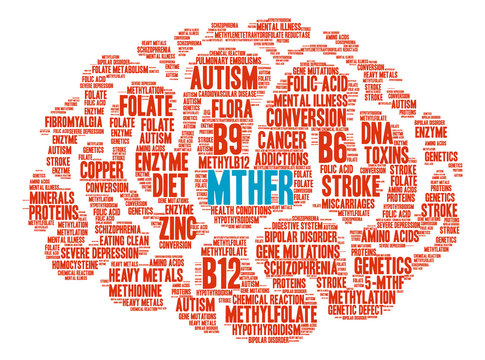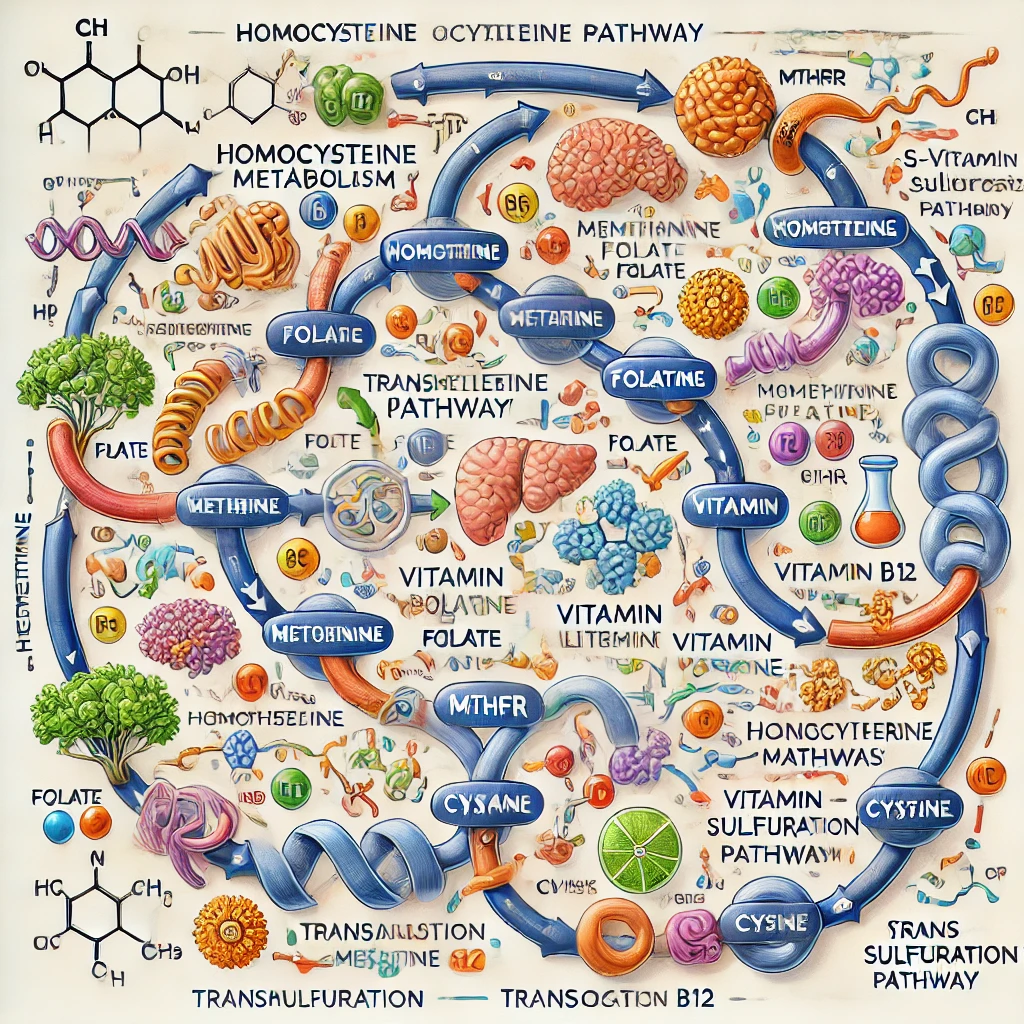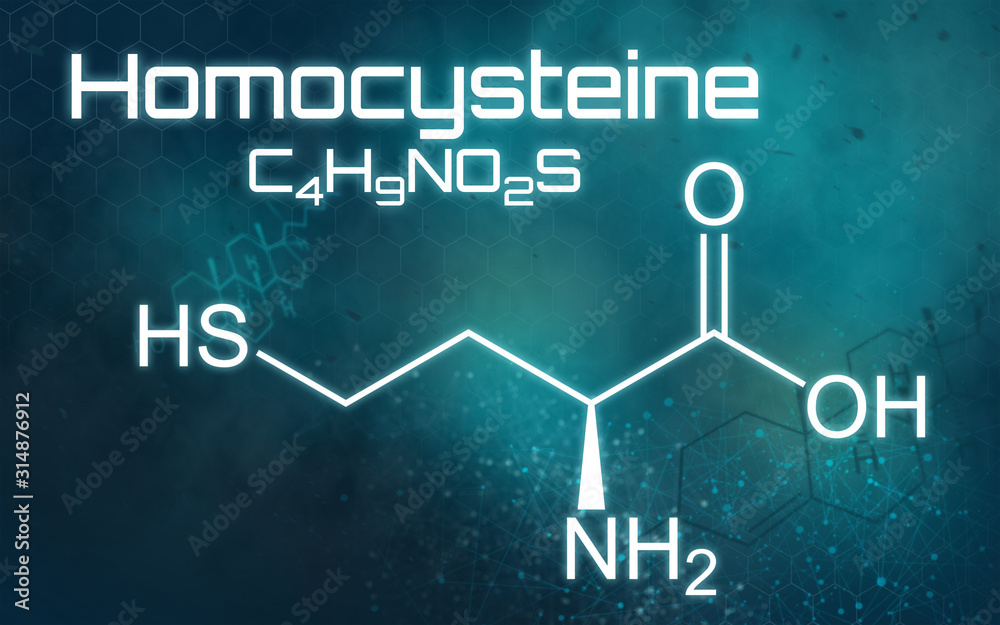Table of Contents
Homocysteine: Insights into MTHFR Polymorphisms
The Role of Metabolic Pathways in Cardiovascular Health
Recent research has highlighted the intricate metabolic pathways involved in maintaining cardiovascular health. One of the key players in these processes is homocysteine, an amino acid whose elevated levels have been associated with an increased risk of heart diseases. Understanding how the body metabolizes this compound is crucial for unraveling its impact on cardiovascular health. These pathways involve complex biochemical reactions, where certain vitamins and enzymes work together to regulate levels, ensuring they remain within a healthy range. By studying these processes, scientists can better understand how disruptions in these pathways, often influenced by genetic factors, might contribute to heart disease, guiding new strategies for prevention and treatment.
Genetic Factors and Their Influence on Heart Health
The metabolism of specific compounds related to cardiovascular health is not solely determined by diet; genetic factors also play a significant role. Variations in genes like MTHFR can influence how effectively these metabolic processes function, impacting overall heart health. For instance, certain genetic mutations can impair the body’s ability to process key nutrients efficiently, leading to imbalances that may increase the risk of heart disease. Understanding these genetic influences helps researchers develop more personalized approaches to cardiovascular care, including targeted nutritional interventions and treatments. This research is essential for creating more effective strategies to prevent and manage heart-related conditions in those with genetic predispositions

The Role of Homocysteine in Methionine Metabolism
What is Homocysteine? Homocysteine is an amino acid derivative formed during the breakdown of methionine, an essential amino acid obtained from our diet. The metabolism of homocysteine is crucial for maintaining cellular function and involves two key pathways: remethylation and transsulfuration. In the remethylation pathway, homocysteine is converted back into methionine, a process facilitated by the enzyme methylenetetrahydrofolate reductase (MTHFR). This reaction requires 5-methyltetrahydrofolate (5-MTHF), a form of folate that acts as a methyl donor. This highlights the essential role of folate in homocysteine metabolism, as methionine not only supports protein synthesis but also serves as a precursor for S-adenosylmethionine (SAMe), a key molecule in DNA methylation and neurotransmitter production.
The Importance of SAMe and Homocysteine Balance
S-adenosylmethionine (SAMe), produced from methionine, is a crucial methyl donor involved in various biochemical processes, including DNA methylation and neurotransmitter synthesis. Maintaining a balanced level of homocysteine is essential for producing adequate SAMe and supporting these vital functions. If homocysteine levels become elevated, it can lead to an increased risk of cardiovascular diseases and other health issues. Therefore, the remethylation process, where homocysteine is converted back into methionine, plays a critical role in regulating homocysteine levels and ensuring that sufficient SAMe is available for cellular processes. This delicate balance underscores the importance of folate, as it directly influences homocysteine metabolism and the overall health of an individual.
Impact of MTHFR Polymorphisms
The Impact of MTHFR Gene Variations on Cardiovascular Health
Genetic variations in the MTHFR gene, particularly the C677T and A1298C polymorphisms, can significantly influence enzyme activity and homocysteine levels, with notable effects on cardiovascular health. The C677T variant is known to reduce MTHFR enzyme activity more dramatically, leading to higher homocysteine levels. Individuals with the CC genotype for the C677T polymorphism often exhibit elevated homocysteine, increasing their risk for cardiovascular diseases. The A1298C variant also decreases enzyme activity, although to a lesser extent. This reduction in MTHFR activity impairs the remethylation of homocysteine to methionine, which subsequently lowers S-adenosylmethionine (SAMe) levels—a crucial methyl donor for DNA methylation and neurotransmitter synthesis.
Health Implications of Altered Homocysteine Metabolism
The genetic variations in the MTHFR gene that lead to reduced enzyme activity have profound implications for cardiovascular health. Elevated homocysteine levels resulting from impaired remethylation are associated with decreased methionine and SAMe production. This imbalance can disrupt DNA methylation, leading to altered gene expression and contributing to conditions such as endothelial dysfunction, oxidative stress, and inflammation—key factors in the development of atherosclerosis and cardiovascular diseases. These genetic predispositions highlight the importance of monitoring homocysteine levels and addressing potential deficiencies in nutrients like folate, which are crucial for maintaining proper homocysteine metabolism and supporting cardiovascular health.
Complexities and Controversies
Complexity in the MTHFR-CVD Relationship
The relationship between MTHFR polymorphisms and cardiovascular risk is complex, influenced by both genetic and environmental factors. While certain variants like C677T are linked to increased homocysteine levels and higher cardiovascular disease risk, not all individuals with these polymorphisms develop hyperhomocysteinemia or related conditions. This variability highlights the multifaceted nature of cardiovascular disease, where other genetic factors, lifestyle, and diet also play significant roles. The presence of an MTHFR polymorphism alone does not guarantee cardiovascular issues, emphasizing the need for a holistic view of risk factors beyond genetics.
Debates Over MTHFR Testing in Cardiovascular Risk
The clinical utility of genetic testing for MTHFR variants in assessing cardiovascular risk remains debated. Some studies suggest that genotyping could guide personalized treatment strategies, particularly in managing homocysteine levels through dietary and lifestyle interventions. However, inconsistent associations between MTHFR polymorphisms and cardiovascular diseases, along with confounding factors, raise questions about the relevance of such testing. Critics argue that the contribution of MTHFR variants to cardiovascular risk may be overstated, pointing to the need for more robust, conclusive evidence before incorporating MTHFR genotyping into routine clinical practice for cardiovascular risk assessment.

MTHFR polymorphisms
Exploring the Impact of MTHFR Polymorphisms on Cardiovascular Health
MTHFR polymorphisms significantly influence metabolic processes that are crucial for cardiovascular health, shedding light on the mechanisms behind certain heart diseases. Variations like C677T can affect the enzyme’s efficiency in processing certain amino acid derivatives, potentially leading to elevated levels that are associated with increased cardiovascular risk. Understanding how these genetic variations impact heart health is essential for developing targeted interventions and preventive strategies. Continued research is needed to clarify the exact pathways through which these polymorphisms contribute to cardiovascular risk, helping to identify individuals who may be more susceptible and guiding personalized approaches to treatment and prevention.
The Need for Further Research and Clinical Application
Understanding the influence of MTHFR polymorphisms on cardiovascular risk is critical for advancing preventive and therapeutic strategies. While these genetic variations provide valuable clues to the underlying mechanisms of cardiovascular diseases, further research is needed to determine the clinical utility of MTHFR genotyping. By investigating how these polymorphisms interact with other risk factors, researchers can develop more precise interventions to mitigate the cardiovascular risks associated with elevated homocysteine levels. Deepening our understanding of these genetic factors will ultimately lead to more effective strategies for promoting heart health and reducing the incidence of cardiovascular diseases in vulnerable populations.
Foods to Lower High Homocysteine Levels
Managing Homocysteine Levels Through Diet
Elevated homocysteine levels in the blood are linked to an increased risk of cardiovascular diseases, but dietary interventions can be a key factor in managing these levels. Consuming foods rich in essential nutrients such as folate, vitamin B6, and vitamin B12 has been shown to effectively lower homocysteine levels. These nutrients play a crucial role in the metabolism of homocysteine, helping convert it into other beneficial compounds and thereby reducing its concentration in the blood. By regularly including foods like leafy greens, legumes, eggs, and fortified cereals in your diet, you can support optimal homocysteine metabolism and contribute to better heart health.
The Role of Nutrients in Heart Health
Dietary choices are powerful tools in maintaining healthy homocysteine levels and promoting cardiovascular health. High homocysteine levels are a known risk factor for heart diseases, but specific nutrients—namely folate, vitamin B6, and vitamin B12—can help manage these levels. Foods rich in these vitamins facilitate the efficient metabolism of homocysteine, preventing its accumulation in the bloodstream. Incorporating nutrient-dense foods such as spinach, beans, poultry, and fish into your diet can have a positive impact on heart health. By making these dietary adjustments, you not only help lower homocysteine levels but also take proactive steps toward reducing your risk of cardiovascular diseases.

Folate-Rich Foods
The Importance of Folate in Homocysteine Metabolism
Folate, or vitamin B9, plays a crucial role in homocysteine metabolism by acting as a methyl donor in the remethylation pathway, where homocysteine is converted back into methionine. Adequate intake of folate through dietary sources has been shown to lower homocysteine levels, supporting cardiovascular health. Leafy green vegetables such as spinach, kale, and broccoli are among the best sources of folate. These vegetables are nutrient-dense and provide a natural way to increase folate intake. Additionally, legumes like lentils, chickpeas, and black beans are rich in folate and offer a versatile option for including this nutrient in your diet. Citrus fruits, including oranges and grapefruits, also contribute valuable amounts of folate, making them excellent additions to a heart-healthy diet.
Boosting Folate Intake Through Diet
Increasing your intake of folate-rich foods can significantly impact homocysteine metabolism, aiding in the prevention of elevated levels associated with cardiovascular risk. Folate is found abundantly in leafy greens such as spinach, kale, and broccoli, making these vegetables a key part of a folate-rich diet. Legumes, including lentils, chickpeas, and black beans, are not only high in protein but also excellent sources of folate, making them a nutritious choice for supporting heart health. Citrus fruits like oranges and grapefruits add variety and sweetness to your diet while providing a substantial amount of folate. By incorporating these foods into your meals, you can naturally boost your folate intake and promote better homocysteine management.
Vitamin B6-Containing Foods
The Role of Vitamin B6 in Homocysteine Regulation
Vitamin B6, or pyridoxine, is essential in homocysteine metabolism, playing a crucial role in converting homocysteine to cysteine through the transsulfuration pathway. Ensuring adequate intake of vitamin B6 can help regulate homocysteine levels, which is vital for maintaining cardiovascular health. Foods rich in vitamin B6 include poultry such as chicken and turkey, which are not only versatile in meals but also contribute significantly to your daily intake of this important vitamin. Fish like salmon and tuna are also excellent sources, providing heart-healthy omega-3 fatty acids along with vitamin B6. Incorporating these foods into your diet supports the body’s natural processes for managing homocysteine levels.
Boosting Vitamin B6 for Heart Health
Incorporating vitamin B6-rich foods into your diet is an effective way to support homocysteine metabolism and overall heart health. Nuts and seeds, such as walnuts, sunflower seeds, and flaxseeds, are not only nutrient-dense but also provide a good amount of vitamin B6. Additionally, fruits and vegetables like bananas, potatoes, and avocados are excellent sources of this vitamin, making them easy to add to any meal plan. By including a variety of these vitamin B6-rich foods in your diet, you can help maintain balanced homocysteine levels, promoting better cardiovascular health and reducing the risk of related diseases.
Vitamin B12-Enriched Foods
The Role of Vitamin B12 in Metabolic Processes
Vitamin B12, or cobalamin, is vital for metabolic pathways that are crucial for overall health, particularly in converting certain compounds back into their essential forms. Ensuring an adequate intake of vitamin B12 supports these metabolic processes, which in turn promotes cardiovascular health and overall well-being. Animal products are the primary sources of vitamin B12, with seafood like clams, mussels, and salmon being particularly rich in this nutrient. Lean meats, such as beef and chicken, also offer substantial amounts of vitamin B12. By incorporating these foods into your diet, you ensure that your body has the necessary tools to maintain efficient metabolic functions.
Vitamin B12 for Various Dietary Lifestyles
For individuals following vegetarian or vegan diets, obtaining sufficient vitamin B12 can be more challenging due to its abundance in animal products. However, fortified plant-based foods can bridge this gap effectively. Options like plant-based milk, nutritional yeast, and fortified cereals provide alternative sources of vitamin B12. Additionally, vegetarians can rely on eggs and dairy products, such as milk, yogurt, and cheese, to meet their B12 needs. By including these vitamin B12-rich foods or fortified alternatives in your diet, you support the body’s essential metabolic processes, ensuring proper function and contributing to long-term health, especially in maintaining cardiovascular efficiency.

Additional Dietary Considerations
Boosting Cardiovascular Health with Antioxidants
Incorporating foods rich in folate, vitamin B6, and vitamin B12 into your diet is crucial, but adding antioxidants can further enhance cardiovascular health. Antioxidant-rich foods like fruits, vegetables, nuts, and seeds help combat oxidative stress and reduce inflammation, two factors that can negatively impact heart health. These foods not only support overall wellness but also complement the benefits of nutrients like folate and vitamins B6 and B12, which play key roles in important metabolic processes. By integrating a variety of colorful, plant-based foods into your meals, you can enhance your body’s ability to maintain a healthy cardiovascular system and protect against the damaging effects of oxidative stress.
The Importance of a Balanced Diet
To optimize your cardiovascular health, it’s essential to maintain a balanced diet that includes adequate protein, healthy fats, and a variety of plant-based foods. Proteins and healthy fats support the body’s metabolic functions, while plant-based foods provide essential vitamins and minerals. This balance helps ensure that your body has the resources it needs to maintain efficient metabolic pathways, which are vital for cardiovascular health. Additionally, a diet rich in diverse nutrients helps keep inflammation and oxidative stress in check, further promoting heart health. By focusing on a balanced, nutrient-dense diet, you can support overall well-being and maintain a healthy cardiovascular system.
Dietary Interventions
Supporting Homocysteine Management Through Diet
Diet plays a vital role in managing homocysteine levels and promoting heart health. By incorporating foods rich in folate, vitamin B6, and vitamin B12, you can support the body’s ability to efficiently manage homocysteine metabolism, which in turn helps reduce the risk of cardiovascular diseases. These crucial nutrients are found in a variety of foods, such as leafy greens, lean meats, and fortified cereals, making it easy to include them in a balanced diet. By prioritizing these nutrient-dense options, you not only help regulate homocysteine levels but also contribute to overall cardiovascular well-being, ensuring your body’s metabolic processes function optimally.
The Power of a Balanced Diet
Adopting a balanced diet that focuses on whole, minimally processed foods provides comprehensive support for cardiovascular health. Such a diet ensures that you receive a variety of nutrients essential for maintaining optimal metabolic functions. Incorporating a wide range of fruits, vegetables, lean proteins, and healthy fats helps reduce inflammation, supports efficient metabolic processes, and protects against heart disease. As part of a holistic approach to wellness, these dietary modifications offer accessible and effective strategies for promoting overall well-being and reducing the risk of cardiovascular issues. By making thoughtful food choices, you can empower your body to maintain a healthy heart and enhance long-term health.
How useful was this post?
Click on a star to rate it!
Average rating / 5. Vote count:
No votes so far! Be the first to rate this post.
Author
-

Meet Dr. Kendall Gregory, a highly accomplished professional with a remarkable academic background and a deep passion for empowering individuals through knowledge. Dr. Gregory’s educational journey began with a Bachelor of Science degree, followed by a Doctor of Chiropractic Medicine, focusing on diagnosing and treating musculoskeletal conditions. He further expanded his expertise with a Master's degree in Oriental Medicine, specializing in acupuncture and Chinese herbology, and a Master's degree in Health Care Administration, emphasizing his dedication to improving healthcare systems. Dr. Gregory combines his extensive knowledge and practical experience to provide comprehensive and integrative healthcare solutions. Through his writings, he aims to inspire individuals to take charge of their health and make informed decisions.
View all posts






